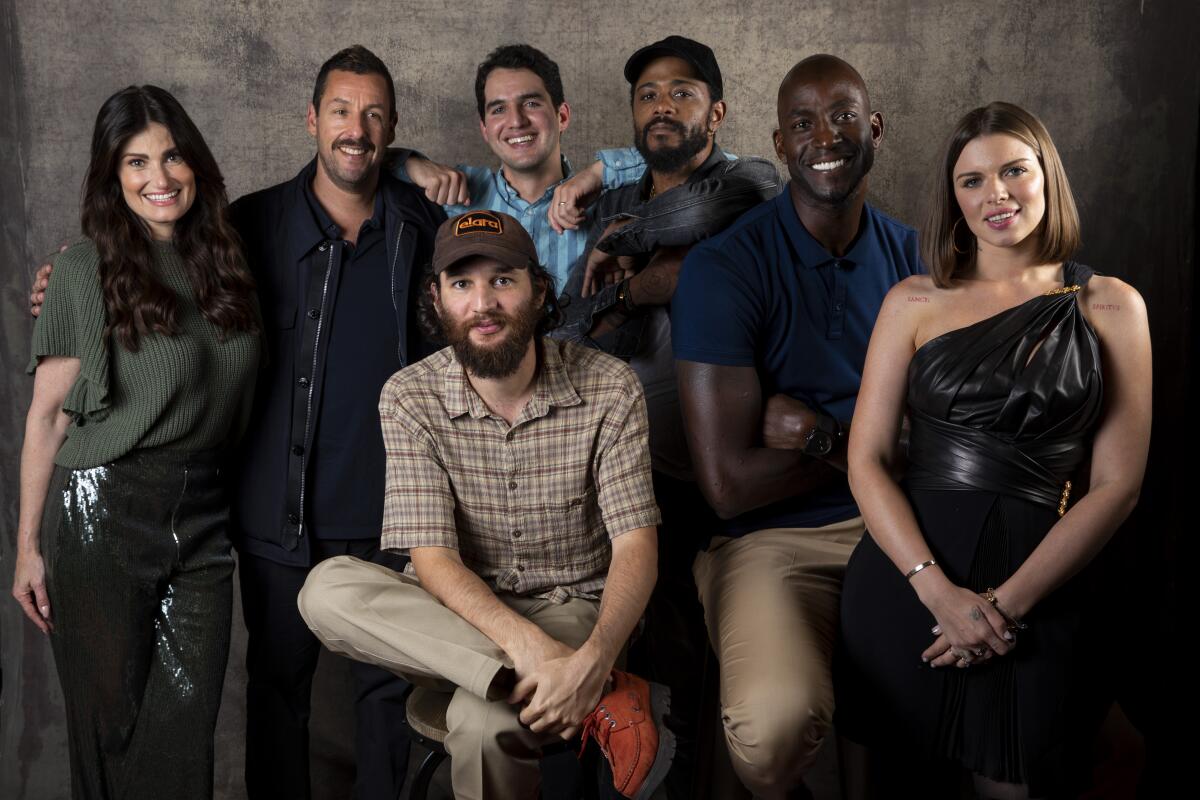Indie Focus: Adam Sandler in overdrive in ‘Uncut Gems’
- Share via
Hello! I’m Mark Olsen. Welcome to another edition of your regular field guide to a world of Only Good Movies.
This week saw the announcement of both the Golden Globe and Screen Actors Guild awards nominations, and the Globes noms in particular garnered a lot of attention, little of it positive. Glenn Whipp gave an overview of the nominees — you can subscribe to his newsletter for more — while Mary McNamara dug into the lack of female filmmakers across the board among the nominated films.
As it so happens, this year’s Envelope directors’ roundtable came out this week, bringing together Noah Baumbach, Bong Joon Ho, Greta Gerwig, Marielle Heller, Todd Phillips and Lulu Wang. As Gerwig noted of the seeming recent uptick in films directed by women, “I don’t ever want it to seem like films by women are, like, ‘Eat your spinach. You don’t like it but it’s good for you.’… Nobody’s [going to our films] because they feel real bad that we’re ladies. They’re doing it because they’re good movies and they’re excited to see them. I think that’s what’s nice about the market showing that there is an audience for ‘Wonder Woman’ or ‘Hustlers.’”
And this week on our podcast The Reel, I spoke to Melina Matsoukas, director of “Queen & Slim,” who talked about why she’d rather you not call her lovers-on-the-run film a “black ‘Bonnie and Clyde,’” as many people have. “I don’t like when black films are based on some white archetype, you know, it’s like we can never just be ourselves. ... For me, there is no way to describe Queen and Slim besides themselves. They just are. They are Queen and Slim.”
For information on upcoming L.A. Times screenings and Q&A events, visit events.latimes.com/screenings.

‘Uncut Gems’
In “Uncut Gems,” Adam Sandler plays Howard Ratner, a New York City diamond merchant with a gambling addiction who is trying to keep all his life’s problems at bay. Directed by Josh and Benny Safdie, the film has a frenetic, propulsive tone that is moved along by Sandler’s powerful performance.
In a review for The Times, Justin Chang called it an “invigorating, maddening movie,” while adding, “‘Uncut Gems’ is a thriller and a character study, a tragedy and a blast. It’s a throwback to the sordid ’70s crime pictures once popularized by filmmakers including Martin Scorsese (a credited producer) but also a snapshot of a highly specific time and place.”
For The Times, Akiva Gottlieb spoke to the Safdies about their long-in-the-making passion project, and about working with Sandler. “He has the ability to internalize the absurdism of everything,” Benny said. “But still, he roots the character in this real feeling, like, ‘Oh, it’s happening to that guy.’”
“He works so hard at everything,” Benny said. “We did so much prep on this movie to understand who this character was. We did test shoots, where he was just hanging out for four hours while we were filming it — trying to understand what Howard does, how he talks, how he watches basketball.”
For the New York Times, Manohla Dargis wrote that the film is “fun if also wearying and at times annoying. It doesn’t seem to add up to much — a little man lives his life — but this is just enough. It’s easier to admire than to love, and I hate the ending, but the Safdies clearly like working your nerves. They’re not interested in the dumb, easy stuff movies give you — the likable, relatable characters, the sermonizing and moralizing; they’re too busy deploying color and noise, pushing the form, testing their (and our) limits.”
For Artforum, Nick Pinkerton considered the high-energy filmmaking of Safdies, noting, “Perhaps to ask for more is to ask the Safdies to compromise their worldview, which presents modern life as a breathless full-court press, a heedless hustle-bustle, a constant contest which can’t be won but only, finally, stopped. In such a world even their downbeat endings — and ‘Uncut Gems’ is no exception — come to seem redemptive, in the sense that they offer the relief of rest, even the quiet of the grave.”
At Slate, Dana Stevens added that it is as if the Safdies “are aiming to reproduce in the viewer a sense of the enormous emotional toll it must take to be around — or, more exhausting still, to be — a black hole of need like the infinitely self-sabotaging Howard. There’s something to admire in the pedal-to-the-metal commitment of their project, and certainly ‘Uncut Gems’ is the product of an uncompromising vision. But I found the result to be claustrophobic and, finally, dull, with scene after scene that hammers home the same point we understood from the very beginning: that Howard is a lost soul, fated to run both his business and personal life into the ground.”
‘A Hidden Life’
The latest film from the enigmatic Terrence Malick, “A Hidden Life” turns away from his recent contemporary-set films to tell a story based on the real life of Franz Jägerstätter, an Austrian conscientious objector during World War II.
In a review for The Times, Justin Chang said it might be “the most frustratingly great movie I’ve seen this year” and called it “replete with such contradictions. It’s a poem and a polemic, an exploratory independent drama and a varnished Hollywood epic, a bold, even visionary work that is not without its compromises.”
For the New York Times, A.O. Scott wrote that unlike most of Malick’s recent films, “it tells a story with a beginning, a middle and end, and a moral. Malick’s lyricism sometimes washes out the psychological and historical details of the narrative. The political context is minimal, supplied by documentary footage of Nazi rallies at the beginning and Hitler at home in the middle. The performers don’t so much act as manifest conditions of being, like figures in a religious painting.”
For Vox, Alissa Wilkinson further explored the film’s religious themes, noting, “‘A Hidden Life’ is Malick’s most overtly political film and one of his most religious, urgent and sometimes even uncomfortable because of what it says — to everyone, but specifically to Christians in places where they’re the majority — about the warp and weft of courage. It’s a film that seems particularly designed to lodge barbs in a comfortable audience during an era of rising white nationalism. Jägerstätter could have lived a peaceful life if he’d simply ignored what was happening in his homeland and been willing to bow the knee to the fatherland and its fascist leader, whose aim is to establish the supremacy of Franz’s own people.”

‘Black Christmas’
Directed by Sophia Takal, who co-wrote with film critic-turned-screenwriter April Wolfe, “Black Christmas” is a loose remake of the 1974 Canadian horror film. Designed to be released on Friday the 13th, the new film stars Imogen Poots and deals with campus rape, giving the story a timely edge along with its slasher and supernatural thrills.
In a review for The Times, Kimber Myers wrote that it “follows in the feminist footsteps of its predecessor, while still subverting audience expectations at each opportunity. Fans of the original — and those who like their horror movies deadly serious and brimming with blood — might not love writer-director Sophia Takal’s take, but ‘Black Christmas’ is a fun film that gets its kicks out of literally smashing the patriarchy.”
The Times’ Sonaiya Kelley spoke to Takal, Wolfe and Poots about bringing their version of this horror classic to life. Calling her film “fiercely feminist,” Takal added, “I think there’s something still subversive about making movies that are about real women who are complicated and flawed and don’t have to be perfect. … I think a lot of times in this modern era people talk about strong women and sometimes people mistake flawless, badass women with feminist characters. I think part of being a woman and making movies about women is allowing us to be flawed.”
Email me if you have questions, comments or suggestions, and follow me on Twitter: @IndieFocus.
More to Read
Only good movies
Get the Indie Focus newsletter, Mark Olsen's weekly guide to the world of cinema.
You may occasionally receive promotional content from the Los Angeles Times.











